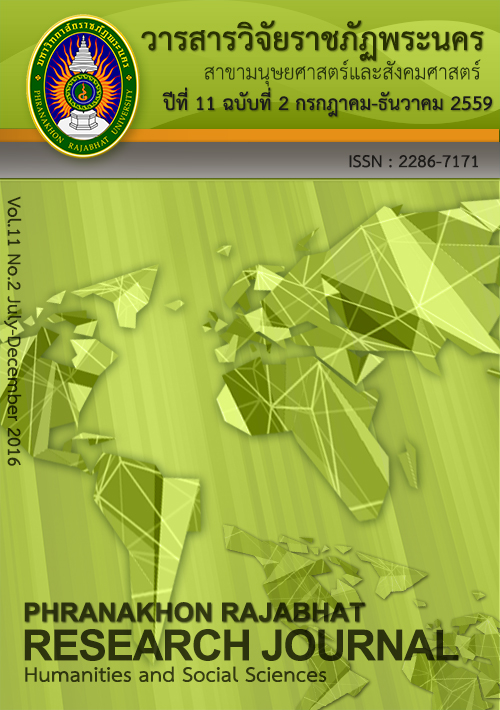ระบายภาพผ่านเฟซบุ๊ก : ปรากฏการณ์ศึกษาการใช้เฟซบุ๊ก ของกลุ่มนักศึกษาไทยในต่างแดน
Main Article Content
Abstract
การวิจัยครั้งนี้เป็นงานวิจัยปรากฏการณ์ซึ่งเป็นการวิจัยเชิงคุณภาพที่ศึกษาปรากฏการณ์และการ
ตระหนักรับรู้ในปรากฏการณ์นั้น ๆ ปรากฏการณ์ที่ศึกษาวิจัยในครั้งนี้เป็นการใช้เฟซบุ๊กของกลุ่มนักศึกษา
ไทยจำนวน 8 คน ที่ได้ไปศึกษาในประเทศจีนระยะเวลา 1 ปี ภายใต้หลักสูตรเทียบโอนหน่วยกิต การวิจัย
มีวัตถุประสงค์เพื่อ 1) ศึกษาการปรับตัวของนักศึกษาหลักสูตรเทียบโอนผลการศึกษาเมื่ออยู่ต่างประเทศ
2. ศึกษาปัญหาหรืออุปสรรคที่นักศึกษาหลักสูตรเทียบโอนผลการศึกษาต้องประสบเมื่ออยู่ต่างประเทศ
ทั้งด้านการเรียน ด้านกลุ่มเพื่อน และด้านการใช้ชีวิตประจำวัน 3. ศึกษาแนวทางในการพัฒนาปรับปรุง
หลักสูตรเทียบโอนผลการศึกษา โดยเก็บข้อมูลจากข้อความและรูปภาพที่นักศึกษาโพสต์ลงเฟซบุ๊กและ
จากการสัมภาษณ์แบบเจาะจง วิเคราะห์ข้อมูลโดยใช้กรอบการวิเคราะห์แก่นสาระ ผลการวิจัยชี้ให้เห็น
ว่าเฟซบุ๊กมีอิทธิพลต่อนักศึกษาขณะใช้ชีวิตในต่างประเทศโดยถูกใช้เพื่อถ่ายทอดเรื่องราวชีวิต เพื่อสื่อสาร
กลับมายังครอบครัว อาจารย์และเพื่อน ๆ ที่เมืองไทย และเพื่อระบายความรู้สึกต่าง ๆ โดยนักศึกษามีแนว
โน้มเสพติดเฟซบุ๊กในขณะที่ผู้วิจัยซึ่งทำหน้าที่เป็นพี่เลี้ยงจะใช้ข้อมูลจากเฟชบุ๊กเหล่านี้เพื่อให้คำแนะนำ ปรึกษาและแก้ปัญหา เรื่องราวที่ถ่ายทอดผ่านเฟซบุ๊กสะท้อนปัญหาต่าง ๆ จากการขาดความรู้ความเข้าใจ
ด้านประวัติศาสตร์ การเมืองและวัฒนธรรมของประเทศที่ไปศึกษาและการให้ข้อมูลล่วงหน้าจากหลักสูตร
อย่างไม่เพียงพอ ผลการวิจัยชี้ให้เห็นว่าหลักสูตรเทียบโอนหน่วยกิตจำเป็นต้องสร้างระบบเพื่อรองรับการ
ศึกษาต่อในต่างประเทศใน 3 ระยะ คือ ระยะที่ 1 ก่อนการเดินทางต้องมีการเตรียมความพร้อมด้านจิตใจ
แก่นักศึกษาและการให้ข้อมูลที่ครบถ้วน ระยะที่ 2 ระหว่างการเรียน ต้องมีระบบพี่เลี้ยงอิเล็กทรอนิกส์คอย
ให้คำปรึกษาและความช่วยเหลือต่าง ๆ และ ระยะที่ 3 หลังเดินทางกลับ ต้องมีกระบวนการใคร่ครวญให้
นักศึกษาสะท้อนคิดถึงประสบการณ์ที่ผ่านมาเพื่อนำไปสู่การเรียนรู้และการพัฒนาตนเองอย่างแท้จริง
This article reports on a phenomenological study, which aimed 1) to investigate Facebook behaviors of Thai students who study abroad; 2) to explore the lived experience that was reflected through Facebook; and 3) to develop a model for improvement of the credit transfer curriculum. Data were collected from Facebook status updates of eight students during their one year study in a China university and focused interviews. Thematic analysis was employed to analyze the data. Results of the study suggest that 1) Facebook had a great influence on Thai students when studying abroad. The students tended to be Facebook addicted. Facebook was used to portray their lived experience; to communicate with family, mentor and acquaintances back in Thailand; and to articulate multiple events that resulted in both negative and positive feelings towards their transcultural experiences in China. Problems that were reflected through Facebook status updates included lack of understanding of history, politics, and cultures; lack of pre-departure briefings; and life and education struggles. The researcher, who also acted as their mentor, used information which were reflected through the mentees’ Facebook to advise and assist the mentees in solving problems. Results from the study indicate that credit transfer curriculum need to develop a three-stage supporting system. Stage 1, or pre-departure period, should provide their students with psychological preparation and provision of information relevant to history, politics and cultures of the host country. Stage 2, or implementation period, e-mentoring will need to be systematically developed. And Stage 3, or post-trip period, in which the students are provided with chances to systematically reflect on their past one-year overseas experience for the true construction of tacit knowledge and real self-development.
Article Details
Each publish articles were copyright by Phranakorn Rajabhat University
Any contents which appeared in each articles in the journal were authors personal opinion. It did not relate to Phranakorn Rajabhat University and other instructors in the university. Each authors would take responsibility on their articles. If there are any mistake, the authors will take responsibility themselves
References
ภาษาไทย
กุลนารี เสือโรจน์. 2556. พฤติกรรมการสื่อสารของวัยรุ่นในพื้นที่สาธารณะบนเว็บไซต์ เครือข่ายสังคมออนไลนเฟซบุ๊ก. รายงานวิจัยภายใต้งบประมาณสนับสนุนคณะวารสารศาสตร์และสื่อสารมวลชน มหาวิทยาลัยธรรมศาสตร์.
ชาย โพธิสิตา.2550. ศาสตร์และศิลป์แห่งการวิจัยเชิงคุณภาพ. กรุงเทพมหานคร : บริษัท อมรินทร์ พริ้นติ้งแอนพับลิชชิ่ง จากัด.
วิจารณ์ พานิช. 2555. วิถีสร้างการเรียนรู้เพื่อศิษย์ในศตวรรษที่ ๒๑. กรุงเทพฯ : มูลนิธิสดศรี-สฤษดิ์วงศ์,
รุ่งทิวา เสาร์สิงห์. 2552. แนวคิดการพัฒนารูปแบบพี่เลี้ยงอิเล็กทรอนิกส์. วิจัยปริญญาการศึกษามหาบัณฑิต สาขาเทคโนโลยีเพื่อการศึกษา คณะเทคโนโลยีสารสนเทศ มหาวิทยาลัยเทคโนโลยีพระจอมเกล้าพระนครเหนือ
รัศมี สาโรจน์. 2547. การจำแนกกลุ่มการเสพติดอินเทอร์เน็ตของนักศึกษาปริญญาตรี มหาวิทยาลัยขอนแก่น. รายงานการศึกษาอิสระปริญญาวิทยาศาสตร์มหาบัณฑิตมหาวิทยาลัยขอนแก่น.
อัญญา ปลดเปลื้อง. 2556. การวิเคราะห์ข้อมูลเชิงปรากฏการณ์วิทยา. วารสารพยาบาลกระทรวงสาธารณสุข ปีที่
ฉบับที่ 2 (พฤษภาคม-ธันวาคม, 2556). 1-10.
ภาษาอังกฤษ
Babbie, E. 1995. The practice of social research (7th ed.). Belmont, CA: Wadsworth.Greig, A., & Taylor, J.1999. Doing research with children. London: Sage.
Kram, K. 1985. Mentoring at work :Development relationships in organizational life. Glenview, ILL Scott Foresman,
Harzadin, T. 2012. Facebook. Available; http://www.psikolojikterapi.com/facebook-bagimliligi.html
[Accessed 2 June.2015]
Hycner, R. H. 1999. Some guidelines for the phenomenological analysis of interview data. In A. Bryman & R. .G. Burgess (Eds.), Qualitative research (Vol. 3, pp. 143-164). London: Sage.
Kuss, D. J., & Griffiths, M. D. 2011. Online social networking and addiction “—. A review of the psychological literature. International journal of environmental research and public health, 8(9), 3528-3552. http://dx.doi.org/10.3390/ijerph8093528
Rungwaraphong, P. 2012. The promotion of learner autonomy in Thailand tertiary education: Lecturers’ perspectives and practices. Unpublished doctoral dissertation, Victoria University of Wellington, New Zealand.


